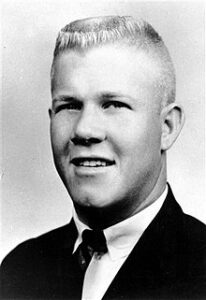Charles Whitman was a handsome, bright engineering student at the University of Texas at Austin. A former US Marine, he enjoyed playing piano, volunteering as Boy Scout leader and spending time with his young wife Kathleen. By most accounts he was a pretty good guy, except for that time on August 1, 1966 when he climbed into a clock tower overlooking the campus and shot forty-six people with a sniper rifle in the first mass-shooting in US history.
Hours before his killing spree, Whitman dispatched both his mother and wife with a hunting knife, taking the time to phone both their workplaces and let them know they wouldn’t be coming in that day.  As if the receding humanity within Whitman was reaching out to those left behind, the note beside his wife’s body read: “After my death I wish that an autopsy would be performed on me to see if there is any visible physical disorder … Maybe research can prevent further tragedies of this type.”
As if the receding humanity within Whitman was reaching out to those left behind, the note beside his wife’s body read: “After my death I wish that an autopsy would be performed on me to see if there is any visible physical disorder … Maybe research can prevent further tragedies of this type.”
Obviously he was not well. Whitman visited a number of doctors before that fateful day, one of which noted the “massive, muscular youth seemed to be oozing with hostility” and “that something seemed to be happening to him and that he didn't seem to be himself.” He was prescribed Valium. Whitman instead took Dexedrine.
On the fateful day Whitman packed a small picnic along with eight weapons and 700 rounds of ammunition. Once atop the clock tower he managed to methodically murder scores of scattering pedestrians for more than ninety-minutes before finally being felled by two police officers and a civilian who stormed his perch twenty stories above the terrified town. When doctors later examined his bullet-riddled body they found a pecan-sized tumor pressing against the same area of the brain affected by those diagnosed as psychopaths.
Psychopathy is an odd affliction only documented by the medical community in the last 40 years. About one percent of humanity seems to have a wiring problem with two walnut sized regions of the brain called the amygdalae that process what we recognize as human emotions. If there is a physical seat of the soul, our devine essense might have one butt cheek nestled in each of these neuro-nodules. Depending on the severity of the situation, people with psychopathy can range from mere narcissism to perceiving other humans as objects to be preyed upon.
As his illness progressed Whitman made the rare journey from human to monster and knew well something was horribly wrong. He wrote, “I talked with a doctor once for about two hours and tried to convey to him my fears that I felt overwhelming violent impulses…Since then have been fighting my mental turmoil alone, and seemingly to no avail.”
His tumor-related break with humanity actually shows how vanishingly rare such random acts of violence are – the Austin police department didn’t even have an emergency response team at the time (they do now). Every day billions of people go about their business often in very close quarters without the apparent need to kill each other.
Amongst such pervasive tranquility it was easy for a newly psychopathic Whitman to plan and execute his epic rampage. He had an IQ of 139, was an expert marksman with sharpshooters badge from the Marines and the observation deck afforded him a 360-degree vantage 230 feet above the bustling campus. Some victims were picked off from an impressive distance of almost half a kilometer away.
In spite of this horrific scene, the real story here is one of humanity. Many of the wounded or killed were struck down trying to help others. A 64-year old shopkeeper Homer Kelly dragged three injured students to safety inside his store before being shot himself. Local pilot Jim Boutwell circled his plane with a police sharpshooter above the tower before being chased off by bullets and high winds. A civilian named Allen Crum made the counter-intuitive choice to borrow a gun and storm the clock tower with the two officers who finally killed Whitman in a close range shoot out. Why did they do it?
Empathy is perhaps the most illogical of emotions. In an allegedly dog-eat-dog world, why would it make sense to think of someone else – especially during life and death moments like that?
To understand empathy, we have to have a closer look at its notorious opposite, psychopathy. Scientists are normally a conservative cohort but Dr. Robert Hare, one of the leading experts on the subject chillingly opined, “psychopaths are social predators, and like all predators, they are looking for feeding grounds. Wherever you get power, prestige and money, you will find them.”
Psychopathy is a staple of Hollywood scriptwriters and the movie industry has made many millions making normal humans feel inferior to the likes of Hannibal Lector. However if psychopaths are so superior to normal humans, why aren’t there more of them? Humans as a species are not merely explosively successful; we have also been around in anatomically modern form for 100,000 years. Given that stretch of natural selection, why aren’t 50% or 100% of us psychopathic?
Richard Wrangham may have an answer. A professor of biological anthropology at Harvard, he compared the behavior of two of our close relatives, chimpanzees and bonobos. Chimps regularly experience murderous violence, both within their family groups and with neighboring troupes. Bonobos are closely related but a distinct species, isolated for millennia by a bend in the Congo River and display far less routine mayhem. Wrangham postulated that this isolation allowed bonobos to explore different social structures than the typical alpha male model found in other primates. Instead of one dominant individual who enforces his access to females with violence, bonobos have a much more flat societal structure where females play a stronger leadership role. Bonobos also have physical features that researchers recognized as evidence of domestication, such as smaller canine teeth. Did bonobos manage to domestic themselves, and if so how?
Wrangham and his colleagues noted a trait in bonobo society also seen in isolated indigenous societies: capital punishment. If a bonobo male exhibits excess violence or is otherwise antisocial they are killed in cooperative decision by other males.  This is tricky behavior since it requires complex and subtle communication - conspiring with others to commit murder can endanger yourself if there is not consensus. The same strategy is seen in virtually all pre-technology human cultures where aberrant offenders are first socially isolated and ultimately killed if there is no other choice.
This is tricky behavior since it requires complex and subtle communication - conspiring with others to commit murder can endanger yourself if there is not consensus. The same strategy is seen in virtually all pre-technology human cultures where aberrant offenders are first socially isolated and ultimately killed if there is no other choice.
Is this codified violence a vehicle of emergent morality? The evolutionary advantage for bonobos and certainly humans seems obvious. There are now over seven billion people on the planet - a population that would never be possible if routine violence prevented complex societies from functioning. The reason is that always thinking of yourself is not an evolutionary advantage. Put another way, a hypothetical race of Hannibal Lectors released into the wild would quickly perish because they would not be able to trust each other. Working alone or preying on each other, our imaginary population of super villains might soon disperse, starve, or become an easy meal for more capable natural predators. In a world full of superior predators, our superpower is not shark-like self-interest. Humans are so successful because for some reason we compulsively want to help each other. Cooperation and empathy amongst humans has been a clear evolutionary advantage.
So what does this have to do with AI? A machine intelligence freed from the frailties of biology need not worry about evolutionary advantage. It remains to be seen whether abstract concepts so familiar to us would have any intrinsic resonance with a machine intelligence.
However emergent morality is ubiquitous in human societies throughout history and among some of our closest relatives. Our default towards cooperation bootstrapped conditions that allowed artistic expression and culture to flourish. The gold plated record bolted to the side of Voyager highlighted examples of human art, language and culture; those achievements of which we are most proud. The absence of mayhem means existence is free to be enjoyed and celebrated - perhaps as close to a prime directive as we are going to get. Could this be self-evident to an AI as well?
We also need to be mindful of the flip side lesson from the bonobos. Would an omnipotent AI instead observe the mayhem we have inflicted on each other and the natural world and conclude that we are an antisocial element that needs to go? The baby is coming and we had better look our best.